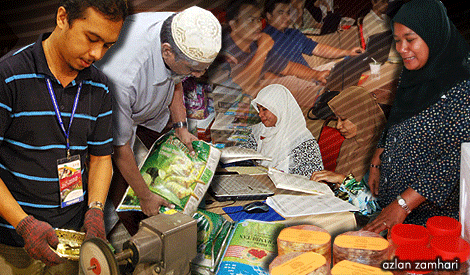
After chairing the Bumiputra Economic Council (MEB), the Prime Minister proudly announced that 23 Ministries have at least reached 90 percent of their Key Performance Indicators(KPIs) and eight had attained 100 percent of their performance targets.
This achievement is impressive and laudable indeed. But it begs the question as to how much these bumiputera target groups have really benefitted from these vast expenditures?
Its good to spend public funds to empower bumi businessmen and women, but are there leakages like corruption and wastage of public funds and sub contracting?
More importantly, are these tax payers' funds actually equipping these bumi contractors with the right skills, capabilities and real experience in sustaining the bumi business progress?
A large chunk of 63 percent of the value of the annual works of ministries and government agencies was awarded to bumi contractors. This is a significant size of government budget funding and it is hoped that the bumi contractors did not subcontract or rent out too much out to others.
It is therefore proposed that our government needs to monitor these subcontracts to especially foreigners, who will then benefit more than the bumi contractors. They would take away their experience and acquired expertise back to their own countries. Then our bumi contractors would not have gained as much knowledge and skills as they should, inobtaining these small and especially large contracts. Hopefully, the bumi contractors are competent and capable, otherwise the public suffer from wastage and poor performance of projects and services.
The bumi cooperatives also benefitted from a large cumulative turnover of RM31 billion. Hopefully, these huge funds were efficiently managed to enhance the welfare of the needy cooperatives and especially the low income cooperative members.
More affordable houses were built in 2016 for bumis. About 3,476 units were built in 2016 compared to only 213 units in 2015. This is most welcome although much more could be done in this vital area of high demand for low cost housing. The Industrial Building System (IBS) can accelerate the building of affordable housing and government should step up the building of affordable housing through the IBS , even if vested interests obstruct the IBS.
Actually housing is a basic need and comprises a large share of consumer spending in rentals and meeting housing loan instalments. Greater priority could therefore be given to build affordable housing, not only for bumis but for non-bumis as well.
When too much differentiation is made to provide basic needs like housing and scholarships, to Malaysians of different races, reactions and even resentment builds up .
This can cause national disunity, which has to be avoided, in the interests of better welfare and progress for the whole country.
The SLIM or `1 Malaysia Training Scheme `, is most useful for training bumis to find suitable employment. With thousands of bumi and other graduates left unemployed the SLIM role to train them to find suitable jobs especially in the fields of technology and the service industries, is worthy of all our support.
But it begs the question as to why the public universities seem to be producing somany unemployable graduates. The private universities do not have similar problems. Hence it might be pertinent to review the curriculum and medium of instruction in many of our universities to ensure that we are not churning out more unemployable graduates , most of whom would be bumiputeras. This issue is important to address soon, as these unemployed graduates can pose social problems, cause social tensions and even instability.
Conclusion
The Bumiputera Economic Empowerment (PEB) programme is a pillar in our overall socio economic development planning and the foundation of the 11th Malaysia Development Plan. The PEB has to be pursued energetically to achieve its Key Performance Indicators (KPIs).
But we have at the same time, to ensure that the enormous funds that are generously provided by the government for bumi enhancement, are efficiently and effectively utilised to benefit the bumiputeras positively.
They must be able to gradually reduce the subsidies and protection given to bumis so that they may raise their capacities to compete independently in the increasingly competitive globalised world.
We cannot carry on with these protective policies up to 2050 under the Transformasi Nasional 50, without adversely affecting Malaysia`s long term sustainability and the progress of the bumiputera and other Malaysian communities .
We have to face the realities of a more competitive and digitalised economy that is already here to stay - or lose out to the rest of the world!
Our leaders must ensure that Malaysia boleh!
RAMON NAVARATNAM is chairperson of Asli/Centre for Public Policy Studies.- Mkini
No comments:
Post a Comment
Note: Only a member of this blog may post a comment.